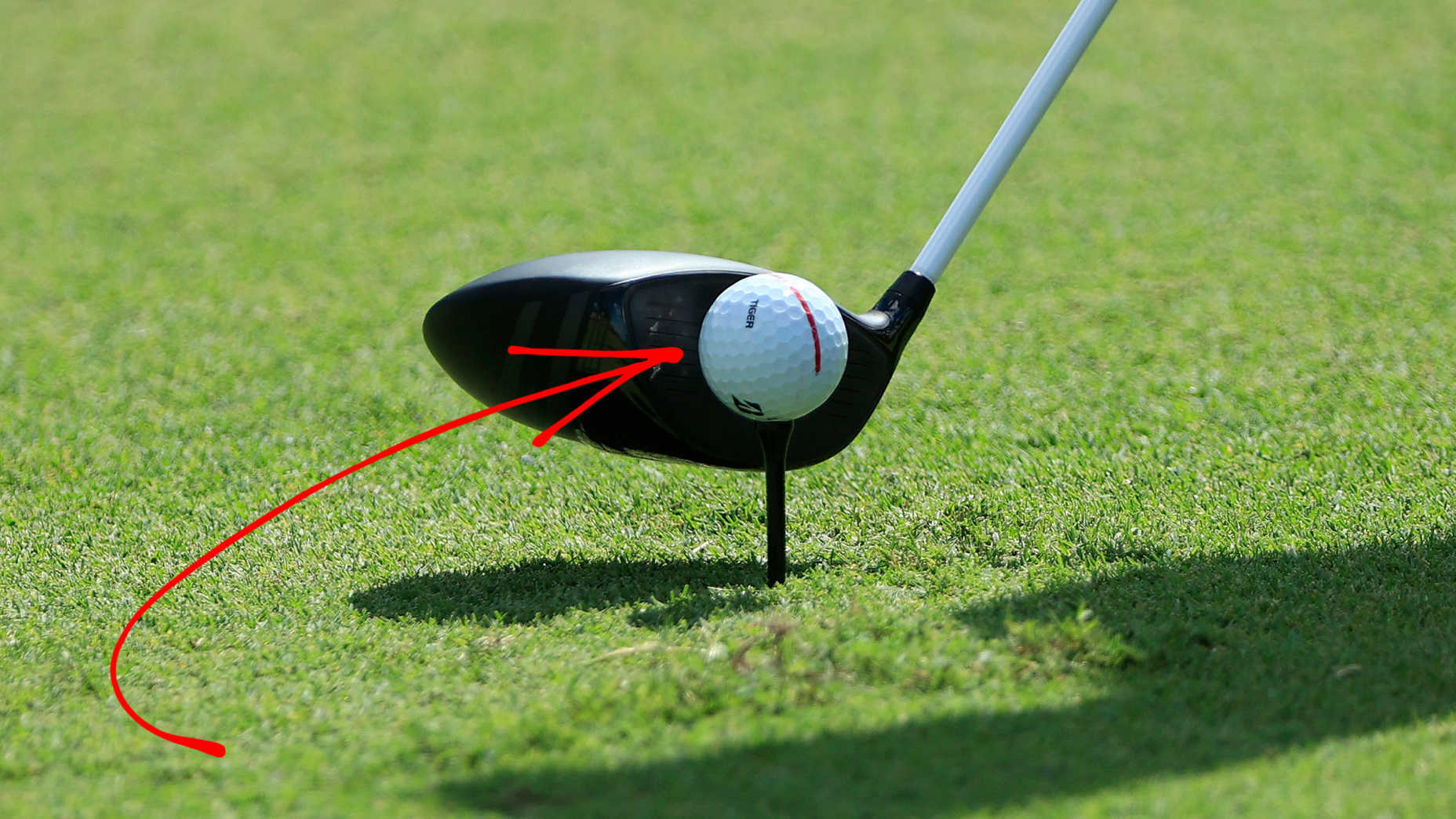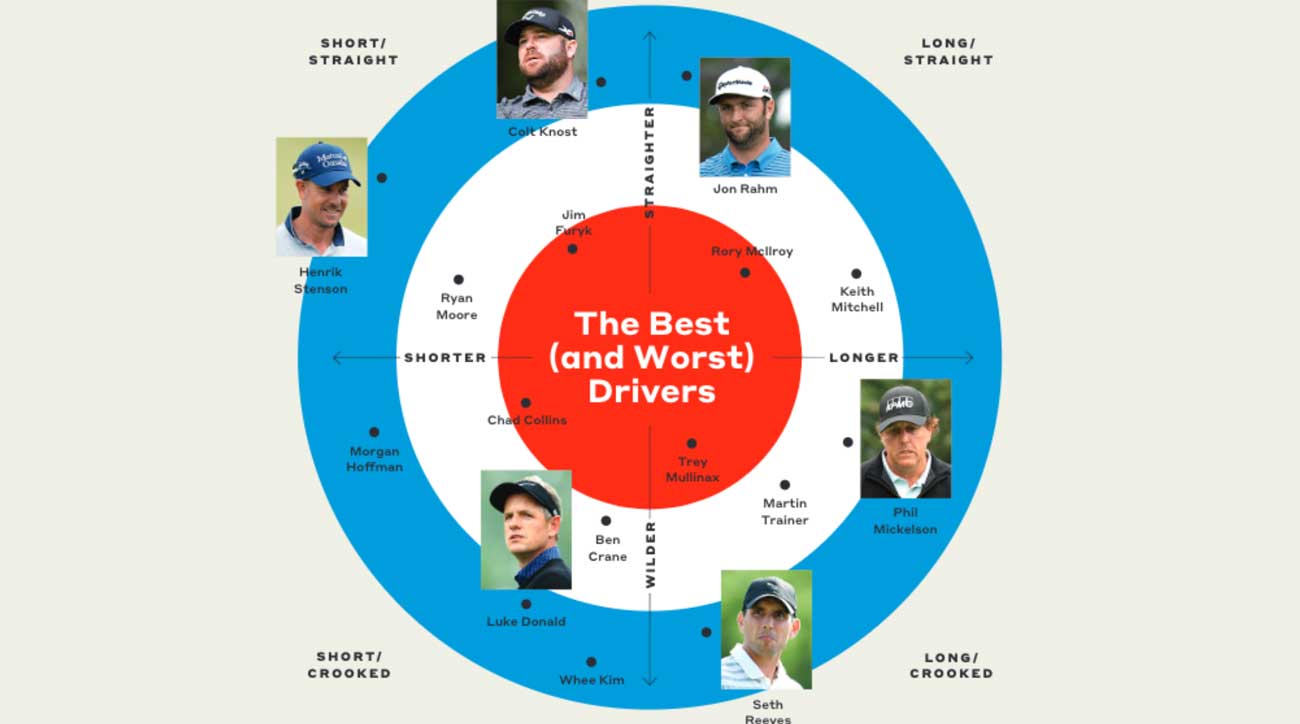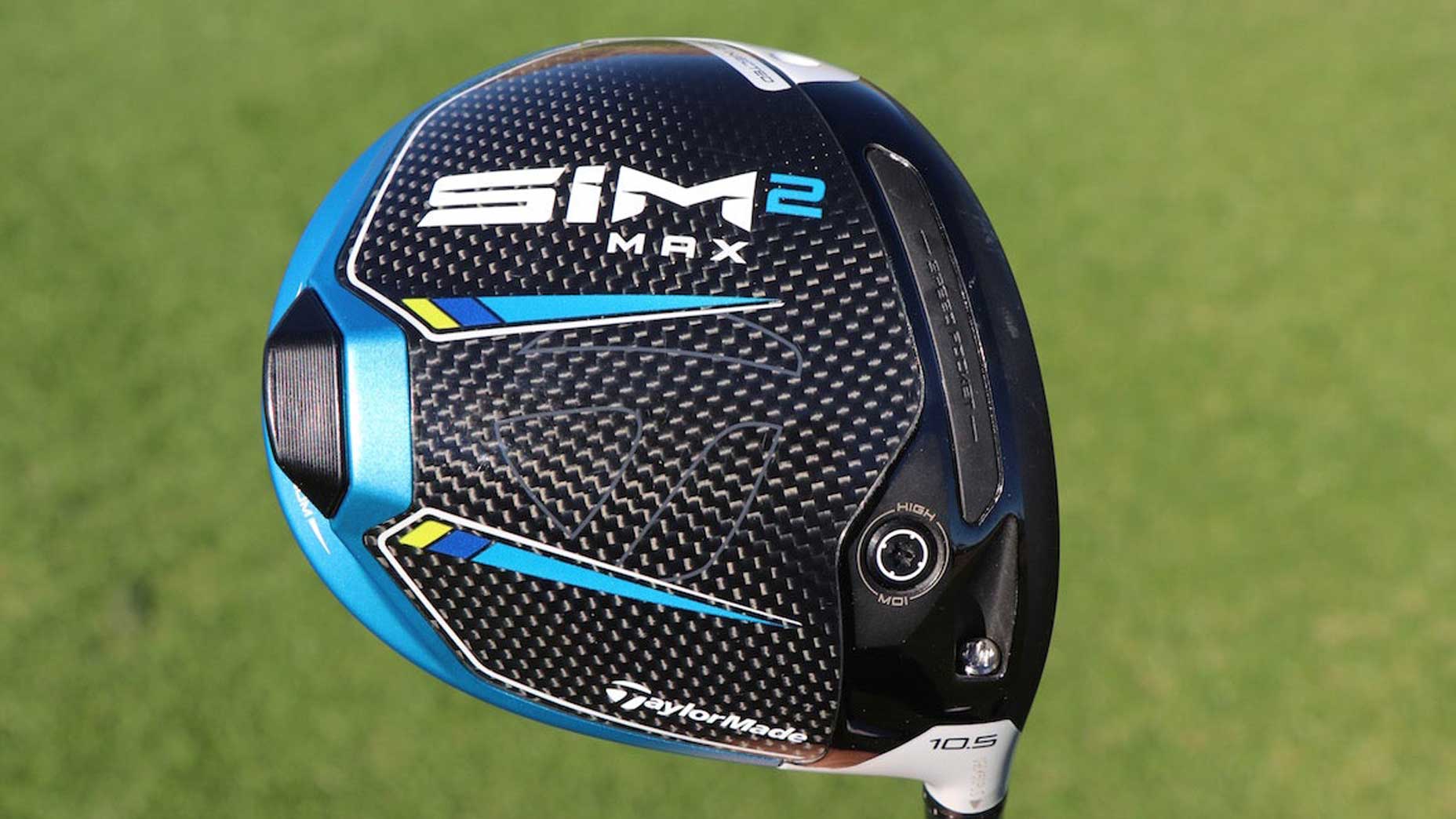
How to hit more fairways? Try these tips on for size.
Getty Images
When I was playing golf most often and most seriously, I quickly realized that keeping the ball in play off the tee is essential to competitive golf. The only problem is that I was never particularly good at it. But that was before I’d tapped into the network of brilliant minds that exists at golf dot com. And while I don’t spend a ton of time writing instruction articles, I definitely do read them — and I’ve picked up some nuggets in the process. Here are 10 tips on straighter drives I’ve compiled from that research.
1. Curve it less!
For at least seven or eight of these tips I’ll expect you to start with a groan or some variation of “Yeah, no s—!” But hopefully we can move past that together and glean a little insight. This comes from a study conducted by golf data guru Mark Broadie, who was curious whether it’s more effective to dial in a big-swinging ball or have it start straight and stay straight. The straight-ball hitters won out convincingly. Here’s Broadie:
“To see the connection between curve and accuracy, I computed the correlation of these values across players. Guess what? The correlation was negative 40 percent, which in plain English means that players who curve their drives less tend to hit more fairways! (For the stat geeks out there, the negative correlation result holds up even after controlling for drive distance.) For example, the big curvers, Andrew Putnam, Phil Mickelson and J.B. Holmes, hit eight percent fewer fairways than the field.
“The least-curve group of Armour, Furyk and Reavie hit 13 percent more fairways than the field, a significant statistical difference between the two groups.”

Mark Broadie’s data from the 2019 season.
GOLF
You can read the rest of Broadie’s piece here.
2. Own your ball flight.
Hopefully this doesn’t sound like I’m already contradicting myself. But just because you’d like to hit the ball dead-straight, per Tip No. 1, doesn’t mean that’s the reality available to you at the moment.
“Most players have a dominant shot shape (draw/fade) and should use that through the round,” says GOLF Top 100 Teacher Joe Plecker.
“You have to go with your stock shot,” adds Top 100 Brian Manzella. Doing so will help you commit to the shot and allow you to pick a proper aiming point.
3. Hit driver.
For decades, conventional wisdom has dictated that players should club down off the tee to keep the ball in play. Not so, says Plecker. For one thing, the face of your driver is larger than any other club in the bag. Also, you’ve likely hit the big stick more than any other club on the driving range. Take advantage of that practice!
“Most players have hit many more drivers in their practice sessions than 3-woods off the tee, so making a tentative swing with a rarely used club is a recipe for disaster,” says Plecker.
4. Use the line.
This one seems mind-numbingly simple, but maybe that’s the beauty of it. Plenty of golfers use the line on the side of their ball to ensure their putts are going in the right direction. Why not do the same on tee shots? Bryson DeChambeau believes it helps. Maverick McNealy thinks so, too:
“I use the line on the tee to make sure my eye line is square and my alignment is good,” McNealy told GOLF.com. “A lot of tee boxes aren’t always aligned. Some are aimed left; some are aimed right; if your body alignment is off, that’s a big miss.”

Bryson DeChambeau is among those who lines up his ball on tee shots.
Getty Images
All it takes is a Sharpie and a split-second. Worth a try in the new year, at the very least.
5. Use the tee box to your advantage.
Where you tee your ball up may seem like a relatively inconsequential detail, but you can mildly improve your chances of keeping the ball in play by using the angles of the tee in your favor. If you favor a right-to-left ball flight, our Luke Kerr-Dineen recommends you tee your ball up on the left side of the tee box and aiming down the right so that your ball flight will be working back into play. (Read more here.)
6. Aim small.
Top 100 Teacher Brian Mogg subscribes to the theory that you should select a very specific target for your tee shot — thus leaving you maximum margin for error.
“When you absolutely have to hit the fairway, narrow your focus to the smallest target or object you can find. You have to be specific in your mind for what you’re aiming for and committing to,” Mogg says. “Fairways are usually 35-40 yards wide, and there is plenty of room for your ball to find it.”
7. Don’t obsess over fairways.
Fairways aren’t everything. We tend to focus on the binary of whether or not we drive it in the short grass, but being just off the fairway with a shot at the green is decidedly different than being in the rough behind a tree — or, worse yet, in the water. You don’t always have to aim down the middle of the fairway if that means taking on unnecessary risk, points out course management expert Scott Fawcett, who regularly charts courses for Tour pros. Here’s how he thinks about a player’s dispersion on No. 3 at Augusta National:

Augusta National’s par-4 3rd hole
That same logic means you shouldn’t be sacrificing a ton of distance off the tee to hit just a few more fairways, Fawcett adds.
“You simply won’t hit your 3-wood in the fairway much more than driver. Dropping back is giving up 30ish yards on 100% of tee shots to hopefully hit 5-8% more fairways; that is a bad tradeoff,” he says.
8. Double-check the boring stuff.
If you’re a good player feeling suddenly out of whack, there’s a strong chance that you’ve unintentionally changed something in your setup. Check your grip. Check where your feet, hits and shoulders are aimed. And check your ball position.
“Always check your fundamentals,” says LPGA veteran Lizette Salas.
9. Think positive thoughts — and commit!
If you’re facing a high-pressure tee shot because of trouble or situation, work on a positive mindset.
“Focus on what you want to do as opposed to what you don’t want to do,” says Top 100 Teacher Kevin Sprecher. “Visualize the shot you want to hit, make it your most reliable shot. You can even visualize a shot similar to a shot you hit on a previous hole, or on the range. Get a good mental picture.”
Then, he says, commit. No prizes for being tentative.
“Make an aggressive swing, It’s never a good idea to swing easy under pressure.”
10. Check your clubs.
If you’re fighting a hook or slice, adjustable technology can help — you can tweak loft, weight and face angle on many modern drivers.
But many golfers just aren’t playing the proper equipment for their swing speed, as we’re frequently reminded from the clubfitting folks at our sister company True Spec. They’re right — if you’re playing the wrong shaft in your driver, for instance, it’s going to be much more difficult to square the clubface at impact, leaving you prone to the Big Miss. Get those clubs checked.
My last tip is personal: Don’t try to think through all 10 of these tips at the same time, while you’re standing over a tee shot. You might combust.
Happy swinging!










